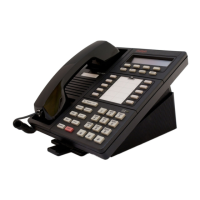MERLIN LEGEND Communications System Release 6.1
System Programming Guide
555-661-111
Issue 1
August 1998
Programming Basics
Page 1-51Product Enhancements
1
■ Users that travel between sites can dial the same digits anywhere in the
private network to access the voice messaging system. For example, a
salesperson headquartered in Cincinnati can dial the same four digits at
the company’s Los Angeles office to retrieve voice messages.
■ Productivity is enhanced because messages can be forwarded and
broadcasted to all personnel within the private network.
■ Calling groups on networked systems can send overflow coverage to a
shared VMS, so that an incoming caller can leave a message instead of
waiting in a queue.
■ The VMS can light the Message Waiting lights on multiple MERLIN
LEGEND systems in a private network. This greater efficiency saves time
because a user only has to look at his or her telephone to determine if he or
she has a message.
Group Calling Enhancements 1
A calling group can have a
single
non-local member that is defined by the Uniform
Dial Plan and exists on another MERLIN LEGEND Communications System
connected by a tandem trunk to the local system. If a calling group contains a
non-local member, the non-local member must be the
only
member in the calling
group. See the
Network Reference
for details.
A calling group containing a single non-local member can be used for the same
purposes as a calling group containing local extensions, including:
■ Night Service. Night Service coverage can be provided across a private
network to a centralized Automated Attendant, a non-local calling group, a
QCC queue, a DLC, or any individual extension on the remote system,
such as a night bell.
■ Group Coverage. Group Coverage can be provided across a private
network to a VMS, a non-local calling group, a QCC queue, a DLC, or any
individual extension on the remote system.
■ Calling group overflow coverage. Calling group overflow coverage can
be provided by a centralized VMS, a non-local calling group, a QCC queue,
a DLC, or any individual extension on the remote system.
■ Calls directed to another system. Lines connected to remote systems
can be answered by any extension programmed to answer the call, such
as a centralized Automated Attendant or a system operator (QCC or DLC).
Transfer Redirect 1
When an Automated Attendant transfers a call to a non-local extension, the
transferring MERLIN LEGEND system monitors the call to ensure that it is
answered. If the non-local extension is not available or the call is not answered
within the transfer redirect timeout period (fixed at 32 seconds), the call stops
ringing at the non-local destination and is redirected to the extension on the same
system as the Automated Attendant that is programmed to receive redirected
calls. This redirect extension can be a QCC queue, a calling group, or an
individual extension.

